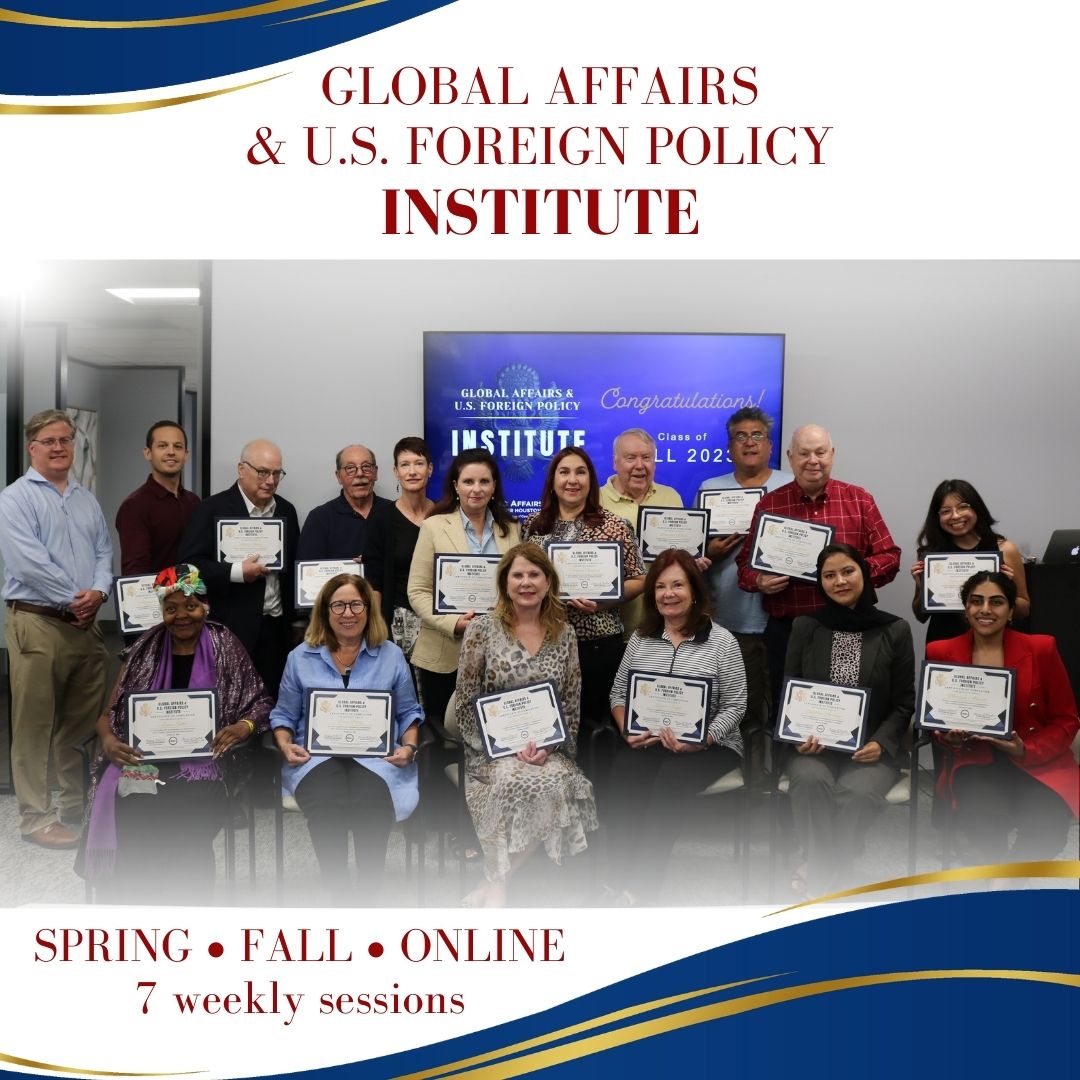The Global Affairs & U.S. Foreign Policy Institute
For those pursuing a deeper understanding of global affairs and U.S. foreign policy to benefit their professional development or personal knowledge, the Global Affairs & U.S. Foreign Policy Institute is an excellent resource to gain a more comprehensive grasp of the world as it is today, and what factors will shape it in the years ahead. The Institute allows attendees to enhance or develop key competencies and a global understanding applicable to: international business, careers with the U.S. government, international NGO’s & non-profits, global risk analysis, and a variety of other fields impacted by world events.
The Institute benefits those who are interested in global affairs, but have only a limited knowledge of the issues. It will also enhance the understanding of those who have an existing familiarity and experience with international issues, but desire to learn more and delve deeper.
Outside experts will join classes 2, 3, 4, 5 & 6 to stimulate discussion and allow students to ask them questions directly. Background reading materials will be given to students before the start of the session, and each week in advance of the next course. Outside experts who spoke to recent sessions of the Institute included: Fmr. FBI Supervisory Special Agent; Fmr. CIA Senior Analyst; Fmr. U.S. Ambassador; Fmr. Venezuelan diplomat; Middle East journalist & analyst; Fmr. cybersecurity expert for the U.S. State Department; University Dean & expert on East Asia; and a New York Times national energy business correspondent. A similar selection of experts will join the next session of the Institute.
Courses will be held once per week on Tuesday from 6:00 – 8:45 pm with a 10-minute break in the middle of each course. Courses are held in person in the Council’s conference room and most, if not all, of the outside experts will join the class in person. At the end of Course 7, the last course of the session, students have the option to make a short presentation and lead a short discussion with the class on a topic of their choosing.
Course Overview
Part I – ‘How the Modern World Order Came to Be & the U.S.’s Role in the World’
With Russia’s brutal war on Ukraine and the growing global might of China, has a New Cold War Era begun? Arguably in the past 30 years, the impact of world events and the need to better understand geopolitical power has never been greater.
This course ‘Part I’ provides a general overview of how the world’s current geopolitical order has come to into being, and what has been and can be the U.S.’s role in influencing the world in the years to come. Particular focus will be placed on those parts of the world where the U.S. has been significantly involved in recent years, such as the broader Middle East. The discussion will include the challenges presented by other major players such as China and Russia, and how other factors shape the world, such as: energy, globalization, nuclear proliferation, alliances and cyber threats.
Part II – ‘Dictators, Democracies & Difficult Decisions: Autocrats, U.S. Foreign Policy & The World Today’
In our nation’s proud democratic history, we have admirably promoted freedom around the world and valiantly fought the likes of Nazi Germany and Imperial Japan. At other times, we have been inconsistent or even coldly calculating in our approach to other dictatorial and repressive regimes.
This course ‘Part II’ will analyze U.S. foreign policy with a focus on how and why the U.S. has sometimes coddled or sometimes attacked various dictators, autocrats and their regimes. It will address what may have been the immediate objectives of such policies, and more importantly the longer-term implications of those actions – for better or worse.
From our nation’s earlier foreign policy towards autocrats in Latin America to Franco, Stalin and others in Europe to Vietnam and Korea to the Middle East, the U.S.’s approach to autocrats has been reasonable at times, and perplexing at others.
The course will examine how dictators and autocrats come to power, and review the methods and tactics they use to remain in control – particularly in the modern era from surveillance systems and cyber tools to social media and manipulating the message and mindset within a nation. How we assess and deal with autocratic leaders now in Russia, China, Iran, Venezuela, North Korea and elsewhere will impact not only the U.S., but also shape the world order and global outlook for years to come.
For more information, please email [email protected] or call the Council at 713 522-7811.
Part I - 'How the Modern World Order Came to Be & the U.S.'s Role in the World'
Week 1 – ‘How the Modern World Order Came to Be’ & Course Overview & Student Introductions
Week 2 – ‘The Rise of the U.S. & Its Involvement in Latin America’
Week 3 – ‘Special Topics: The U.S.’s Role in the Middle East & How Energy Shapes Geopolitics’
Week 4 – ‘How WWI, WWII & the Cold War Shaped the Modern World Order’
Week 5 – ‘The Rise of China, the Resurgence of Russia & Other Challenges for Democracy & U.S. Influence’
Week 6 – ‘U.S. Foreign Policy Since 9/11 & the Challenge of Global Cybersecurity Threats’
Week 7 – ‘Considerations & Concerns for the Years Ahead’ & Student End of Course Presentations
Part I is is offered during the Spring


